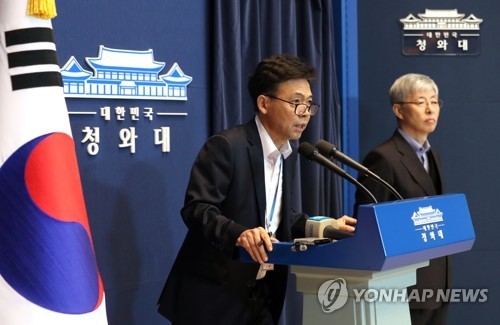The presidential office Cheong Wa Dae on Friday dismissed the possibility of the country facing a financial crisis in the near future, saying the local economy remains strong while its exports continue to grow.
"Some have been raising the possibility of a second foreign exchange liquidity crisis as it will soon be the 20th anniversary since the country faced the last foreign exchange liquidity crisis, but there is no possibility of an economic crisis," Hong Jang-pyo, chief presidential secretary on economic affairs, told reporters.

(Yonhap)
"And the reason is because our economic fundamentals are completely different now."
The Cheong Wa Dae official was referring to the 1997 Asian Financial Crisis, which is better known here as the IMF crisis as the country was then forced to depend on bailout funds from the International Monetary Fund.
Hong noted the country's current account balance stood at a
US$10.3 billion deficit in 1997, but its current account surplus came to $98.7 billion in 2016.
"The country's foreign exchange reserve was at only $20.4 billion at that time. Currently, it stands at $384.7 billion," he said.
Also, the average debt ratio of local firms now remains stable at 67 percent, compared to 396 percent in 1997, he added.
The official also dismissed accusations from opposition parties that the government had reached a secret deal with the United States to renegotiate the Korea-U.S. FTA, but it had deceived the people by saying there will be no renegotiation of the bilateral trade deal that went into effect five years earlier.
"The government has consistently said that it will prepare for all possibilities, including a modification of the Korea-U.S. FTA.
I clearly state that there has been no official or unofficial behind-the-scenes deal," Hong told reporters.
Seoul and Washington agreed last week to start the process of modifying their free trade pact.
"The process has been pursued under the related provisions of the agreement and will continue to be so. The process to change the agreement will begin after all local procedures, such as a feasibility study and a parliamentary hearing, have been met," he added. (Yonhap)



![[Herald Interview] 'Amid aging population, Korea to invite more young professionals from overseas'](http://res.heraldm.com/phpwas/restmb_idxmake.php?idx=645&simg=/content/image/2024/04/24/20240424050844_0.jpg&u=20240424200058)


